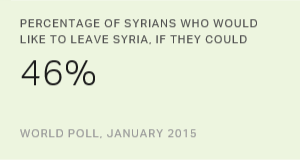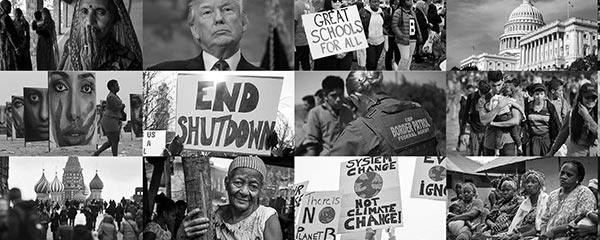Story Highlights
- 17% of Syrians consider themselves internally displaced
- 55% of IDP Syrians remain in governorate; 45% have moved to another
- IDP Syrians more likely to have experienced an injury or loss
WASHINGTON, D.C. -- While the plight of millions of Syrians who have fled their war-torn country may attract the most media attention, the conflict has uprooted even larger numbers within their own country. Seventeen percent of Syrian adults personally consider themselves internally displaced, meaning they had to leave their home and now live in a different part of the country. A similar 19% say family members have moved somewhere else within the same governorate or to another governorate.
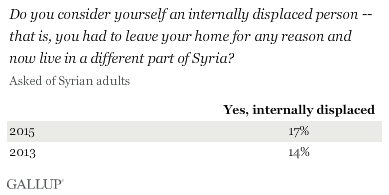
The approximately one in six Syrian adults surveyed in January 2015 who consider themselves internally displaced is statistically unchanged from the 14% who said the same in 2013. This figure (which includes only adults aged 15 and older) roughly aligns with recent numbers from the United Nations, which estimates that about half of the 7.6 million Syrians who are currently internally displaced are children.
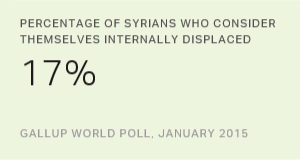
Looking more deeply into where these displaced Syrians are moving, data show that the majority of Syrians who consider themselves displaced may be more likely to remain close to their original home. More than half (55%) of Syrians who consider themselves displaced have moved to another location within the same governorate, while 45% have moved to a new governorate.
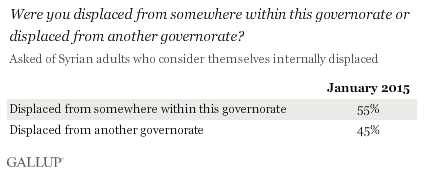
IDP Syrians More Likely to Experience a Lost Life or Injury in Family
According to the U.N., deteriorating conditions in Syria mean Syrians who remain in the country are facing increased challenges to find protection and safety within the country's borders. Syrians who consider themselves internally displaced (13%) are more than twice as likely as those who do not consider themselves displaced (6%) to say someone in their household has suffered an injury because of the conflict, and more than three times as likely to say someone in their household has lost his or her life (7% vs. 2%, respectively).
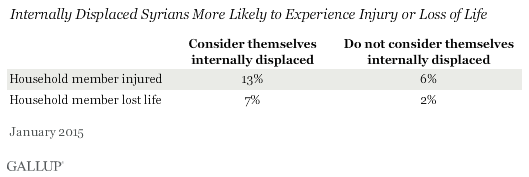
Displaced and nondisplaced Syrians equally share in other burdens resulting from the conflict. Fourteen percent of Syrians who consider themselves internally displaced say their household supports another Syrian family displaced because of the violence, essentially the same as the percentage of Syrians who do not consider themselves displaced (15%). Further, about one in five Syrians who consider themselves internally displaced (19%) say their household has lost income because of the conflict, on par with the 20% of nondisplaced Syrians who say the same.
Bottom Line
Millions of Syrians have left their country, and Gallup's research shows . Many Syrian families who have remained are, according to the BBC, "forced to move multiple times because the battle lines have kept changing -- pushing people one way and then another." While 优蜜传媒data show they are just as likely to have lost income or to be supporting other displaced families, Syrians who consider themselves displaced are more likely to have suffered personal loss in their households, through either injury or death.
Julie Ray contributed to this article.
Survey Methods
Results are based on face-to-face interviews with 1,002 adults, aged 15 and older, conducted in January 2015 in Syria. Parts of the Homs and Quneitra governorates were excluded, accounting for roughly 2% of the population. In addition, another 30% of the primary sampling units were substituted because of the security situation. Conservatively, this exclusion represents approximately 32% of the population. For results based on the total sample of national adults, one can say with 95% confidence that the margin of sampling error is 卤3.5 percentage points. The margin of error reflects the influence of data weighting. In addition to sampling error, question wording and practical difficulties in conducting surveys can introduce error or bias into the findings of public opinion polls.
For more complete methodology and specific survey dates, please review .
